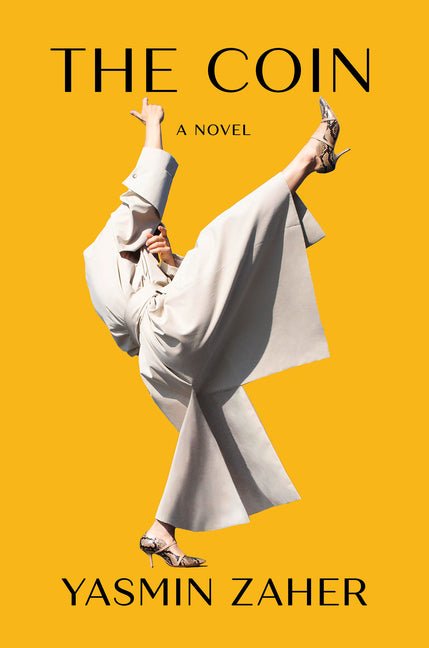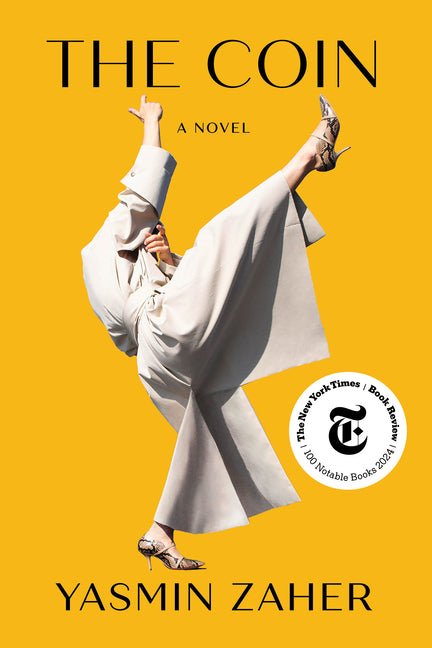Catapult
The Coin
Couldn't load pickup availability
Finalist for the Gotham Book Prize
Shortlisted for the Swansea Dylan Thomas Prize
Longlisted for the Brooklyn Public Library Book Prize
A New York Times Book Review Editors' Choice
A bold and unabashed novel about a young Palestinian woman's unraveling as she teaches at a New York City middle school, gets caught up in a scheme reselling Birkin bags, and strives to gain control over her body and mind
The Coin's narrator is a wealthy Palestinian woman with impeccable style and meticulous hygiene. And yet the ideal self, the ideal life, remains just out of reach: her inheritance is inaccessible, her homeland exists only in her memory, and her attempt to thrive in America seems doomed from the start.
In New York, she strives to put down roots. She teaches at a school for underprivileged boys, where her eccentric methods cross boundaries. She befriends a homeless swindler, and the two participate in an intercontinental scheme reselling Birkin bags.
But America is stifling her--her willfulness, her sexuality, her principles. In an attempt to regain control, she becomes preoccupied with purity, cleanliness, and self-image, all while drawing her students into her obsessions. In an unforgettable denouement, her childhood memories converge with her material and existential statelessness, and the narrator unravels spectacularly.
In enthralling, sensory prose, The Coin explores nature and civilization, beauty and justice, class and belonging--all while resisting easy moralizing. Provocative, wry, and inviting, The Coin marks the arrival of a major new literary voice.
"[A] smart, sneering novel of capital and its consequences . . . In a spiraling, hallucinogenic plot, The Coin draws a dotted line between the narrator's grandmother's garden in Palestine and a splatter of excrement on New York City subway tiles; between her grandfather's birthplace of Bisan--'now a low-income town in Israel, housing mostly Jewish families from Morocco and no Palestinians'--Stokely Carmichael and a Gucci window display appropriating the language of revolution . . . The whiplash feels intentional, funny in an absurdist way, like the narrator's existential seesawing between jaded American consumerism and the sadness and guilt of displacement . . . The novel's power is not in cohesion, but in chaos." --Lauren Christensen, The New York Times Book Review
Share
Book Details
ISBN:
9781646222100
EAN:
9781646222100
Binding:
Hardcover
Pages:
240
Authors:
Yasmin Zaher
Publisher:
Catapult
Published Date: 2024-09-07
View full details

The short blurb I read that attracted me to this book said it was about a young woman in NYC getting caught up in a scheme to resell Birkins. Somehow I read this as "fake Birkins" and pictured the classic "young fresh-out-of-college person of color gets caught up in get-rich-quick scheme and ends up caught in a trap with rich people". Well, it wasn't that. The Birkin part is a small plot in this very stream-of-consciousness novel about a wealthy, rather unlikeable woman who disdains most other humans and is obsessed with cleanliness, wealth and self-presentation. It all climaxes in a scene that would be great in a movie (picture Martin Sheen trashing hotel room in "Apocalypse Now" only with plants and dirt), but I really didn't care at this point. The novel did prompt me to go to CVS and buy some skin care products in an attempt at a moderate "CVS Retreat."I don't think I'm smart enough for this book and didn't really get the references to Palestine which I'm sure were relevant to her story, but I didn't like the narrator enough to care. This is going to be a love-or-hate book for most people. The 3 stars were for the prose.As others noted, a fair amount of typos - pulling something "taut" was misspelled "taught" - how can spelling/grammar check not catch stuff like this, even if no humans are involved in the proofreading? Maybe that proves humans WERE involved.
Such a missed opportunity! Her prose is beautiful, I was intrigued from the start. But alas, now that I am done, couldn’t tell you what it really was about. Maybe next time.
Ugh. I can admire the writing, but not like the book; this was provocation without purpose. I disliked the MC, the root of whose OCD is never addressed, though I assume it’s her Palestinian childhood trauma. The “plot” is perplexing, and I never understood the point of the coin. And I kept catching typos, which just added to my irritation.
Perhaps it is my particular taste in story, or writing style, or something… Perhaps it was the day and time I attempted to “get into” this work. I kept trying, kept reading further and further. Personally, I could not connect. I tried to feed my curiosity about this work and unlock the “attraction” that so many have raved about in reflection. Alas, not happening for me.



